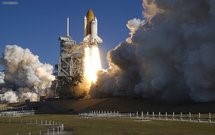 Friday marks the 10th anniversary of the space shuttle Columbia accident. The U.S. government shut down the shuttle program in 2011; despite this fact, the United States and many other countries around the world are competing for a geographic and technological advantage in space.
Friday marks the 10th anniversary of the space shuttle Columbia accident. The U.S. government shut down the shuttle program in 2011; despite this fact, the United States and many other countries around the world are competing for a geographic and technological advantage in space.
Increased global interest in space exploration illustrates its continuing strategic importance. After falling behind Russia in the ability to send people into space, the American public and private sectors are working to lower the costs of doing so.
Several countries have announced in recent months actions to pursue space-related advances. Russia and the European Space Agency both announced plans for moon-related missions. China plans to put 20 new satellites into orbit in 2013 and attempt to land an unmanned vessel on the moon in the same year. This follows benchmark achievements for China in 2012, including manned docking operations with its space laboratory, Tiangong-1. Japan plans to test new launch technology in 2013 aimed at increasing operational efficiency and decreasing costs. There have also been smaller advances made by other interested states, including South Korea's successful launch of an indigenous satellite into orbit and Iran's reported launch of a monkey into space this week.
The competitive nature and the geopolitical importance of space is inherently militaristic since satellites control global communication and navigation. A huge portion of the U.S. military command, control, communication, computers, intelligence, surveillance and reconnaissance capabilities are reliant on this infrastructure, which is instrumental in projecting force and maintaining situational awareness throughout the world.
Most of this infrastructure is relatively indefensible and have few, if any, replacement options. This makes it a prime target for any advanced state in conflict with the United States. Although there is no evidence to suggest that any non-state actor has the ability to threaten space, this is not likely to be a permanent condition. The ability to lift small payloads into orbit trickles down to ever-smaller private enterprises and "rogue" nations like North Korea or Iran, who -- while they may lack refined targeting and maneuverability -- can put debris into orbit in a disruptive and possibly dangerous manner.
More nations building space-based infrastructure could be advantageous to the United States, who leads in this capacity. As these other states continue to build their own infrastructure and rely on its capabilities, a natural deterrence develops. Each side thinks twice before attacking the others because it opens them up to similar retaliation. Compounding this, more nations involved in space could lead to a degree of interconnectedness, meaning that any attack could be perceived as an attack on all countries cooperating with the targeted country. This could spur an international response, a reason for further deterrence. Given that the United States holds most of the physical infrastructure and concurrently relies on it, other actors may see that as incentive to attack it in an attempt to level the playing field in the event of hostilities.
An important step toward further development of space is the increasing affordability of the launch. The space shuttle sought to increase affordability as a reusable launch vehicle, but the cost savings of the program never fully materialized. To further establish territory in space beyond satellites, the lift cost, or the amount of money needed to get material into space, needs to be reduced.
The estimated cost for a single launch into low earth orbit is roughly $10,000 per pound. However, SpaceX, a private company operating in the United States, is set to test a rocket system in 2013 that claims to have reduced lift costs to less than $1,000 per pound, which is considered a reasonable baseline for affordability. (It is unclear whether this cost includes insurance of payloads.) SpaceX plans to achieve affordability through adjustments in launch technology that will allow for easier mass production of the engines, which would reduce production costs, among other things. Advancements such as this, even in the private industry, could allow the United States to re-establish its role as the eminent leader in space exploration. Japan is also looking to reduce launch costs through technological advances aimed at decreasing costly operation time. The Japanese, by using the Epsilon Launch vehicle, plan to test some of these potential improvements later this year.
The present geopolitical importance of space remains. The establishment of satellites to coordinate terrestrial activity will continue. The management of navigation and communications through satellites remains vital. Additionally, the continued technological advances in making space more affordable brings closer the idea of making it habitable.
The United States was long perceived as the leader of space exploration; when the space shuttle program was shut down, that image was left a bit tarnished. Ten years after the tragic Columbia accident and more than a year since the U.S. shuttle program ended, several nations are competing for a future position in space. Through continued efforts at NASA and the country's growing and robust private sector, the United States remains the primary competitor in the arena, but the field is becoming increasingly crowded.
Courtesy : Stratfor (www.stratfor.com)